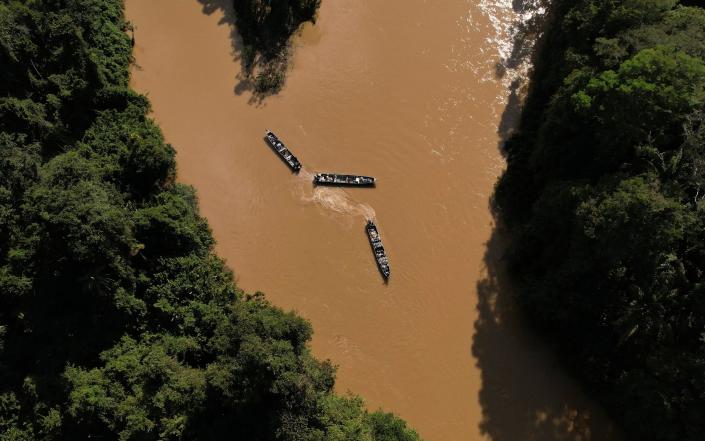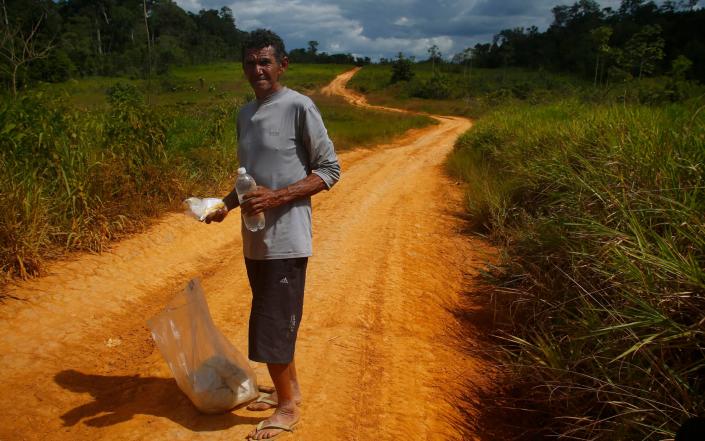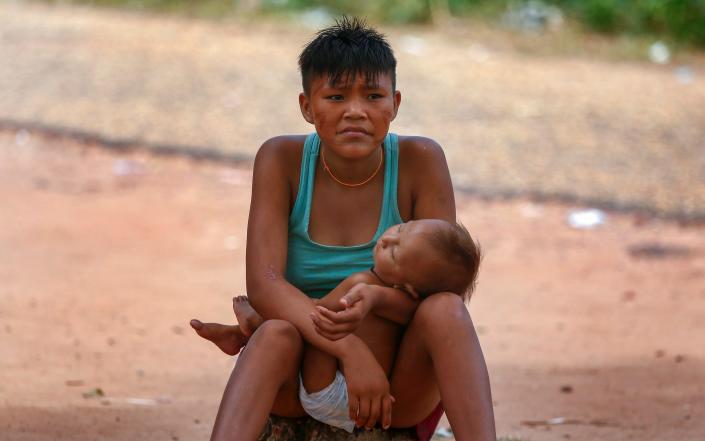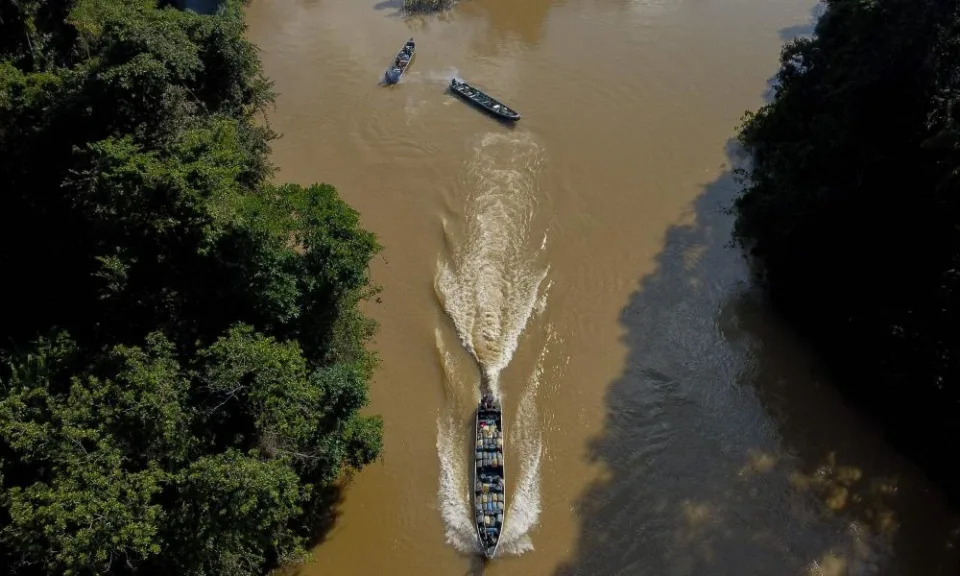Our Foreign Staff
Thu, 9 February 2023

An agent from Ibama watches as an aircraft burns as they expel illegal miners from the area - Ibama/Shutterstock
Armed government officials with Brazil's justice, indigenous and environment ministries pressed illegal gold miners out of Yanomami Indigenous territory Wednesday, citing widespread river contamination, famine and disease they have brought to one of the most isolated groups in the world.
People involved in illegal gold dredging streamed away from the territory on foot. The operation could take months. There are believed to be some 20,000 people engaged in the activity, often using toxic mercury to separate the gold.
An estimated 30,000 Yanomami people live in Brazil's largest Indigenous territory, which covers an area roughly the size of Portugal and stretches across Roraima and Amazonas states in the northwest corner of Brazil's Amazon.

Boats loaded with miners and mining supplies, such as fuel barrels, in the Uraricoera river - AMANDA PEROBELLI/Reuters
The authorities - the Brazilian environmental agency Ibama, with support from the National Foundation of Indigenous Peoples and the National Guard - found an airplane, a bulldozer, and makeshift lodges and hangars, and destroyed them - as permitted by law. Two guns and three boats with 5,000 litres (1,320 gallons) of fuel were seized. They also discovered a helicopter hidden in the forest and set it ablaze.
Ibama established a checkpoint next to a Yanomami village on the Uraricoera River to interrupt the miners' supply chain there. Agents seized the 12 metre (39ft) boats, loaded with a ton of food, freezers, generators, and internet antennas. The cargo will now supply the federal agents. No more boats carrying fuel and equipment will be allowed to proceed past the blockade.

Miners are detained during an operation against illegal mining in Yanomami indigenous land - Ibama/Reuters
The large amount of supplies bound upriver could indicate some of the gold miners were ignoring President Luiz Inacio Lula da Silva's promise to expel them after years of neglect under his predecessor, Jair Bolsonaro, who tried to legalise the activity.
Other miners, however, sensed it was better to return to the city. On Tuesday, The Associated Press visited a makeshift port alongside the Uraricoera River, accessible only by three-hour drive on a dirt road. Dozens of gold miners arrived over the course of the day, some of them after walking for days through the forest, en route to state capital Boa Vista.
One of them, Joao Batista Costa, 61, told reporters the Yanomami are dying of hunger and that recent emergency food shipments have not been enough.

Miner Joao Batista Costa, 61, walks for days to leave the Yanomami indigenous territory ahead of expected operations against illegal mining - Edmar Barros/PA
The federal government has declared a public health emergency for the Yanomami people, who are suffering from malnutrition and diseases such as malaria as a consequence of illegal mining.
A report published yesterday by the Health Ministry found that gold miners have invaded four clinics inside Yanomami territory, leaving them inoperational. In the city of Boa Vista, where starving and sick Indigenous people have been evacuated to a temporary medical facility, there are 700 Yanomami, more than three times its capacity.
The gold miners, who come from poor regions, such as Maranhão state in northeast Brazil, usually cross the forest wearing flip-flops, carrying only food and personal belongings in their backpacks. They sleep in hammocks in campsites.
But their mining depends on sophisticated logistics to outfox authorities and is backed by investors outside the forest.

A Yanomami woman with her child in Boa Vista. The indigenous people have suffered the devastating effects of illegal mining in the region - Edmar Barros/AP
Such tactics include: illicit fuel distribution on the outskirts of Indigenous land; airstrips carved from the jungle for transport of miners and supplies; light planes with modified tail numbers, registered to front companies; helicopters operating between mining sites on the reserves, and clandestine communication networks.
"This operation hasn't come a moment too soon," Sarah Shenker, the head of the non-profit Survival International in Brazil, said in a statement.
"It's absolutely vital that the authorities get the miners out, and keep them out. They've blighted the Yanomami's lives for far too long, and have caused untold misery and destruction. Even if all of them are removed, and they can be kept out, it will take years for the Yanomami and their rainforest to recover."
Brazil launches operation to drive illegal miners from Yanomami lands
Tom Phillips in Rio de Janeiro
Wed, 8 February 2023 at 10:09 am GMT-7·4-min read
The Brazilian government has launched its campaign to drive tens of thousands of illegal miners from the country’s largest Indigenous reserve, with special-forces environmental operatives destroying aircraft and seizing weapons and boats during an operation deep in the Amazon’s Yanomami territory.
Members of Brazil’s environmental protection agency Ibama – with support from the Indigenous agency Funai and the newly created ministry for Indigenous peoples – launched the long-awaited operation on Monday, with troops establishing a base along the Uraricoera river.
Tom Phillips in Rio de Janeiro
Wed, 8 February 2023 at 10:09 am GMT-7·4-min read
The Brazilian government has launched its campaign to drive tens of thousands of illegal miners from the country’s largest Indigenous reserve, with special-forces environmental operatives destroying aircraft and seizing weapons and boats during an operation deep in the Amazon’s Yanomami territory.
Members of Brazil’s environmental protection agency Ibama – with support from the Indigenous agency Funai and the newly created ministry for Indigenous peoples – launched the long-awaited operation on Monday, with troops establishing a base along the Uraricoera river.
Wildcat tin ore and gold miners use the waterway – as well as dozens of illegal airstrips – to reach and supply their illegal outposts in Yanomami lands. Interactive
In a statement on Wednesday lunchtime, Brazil’s government said the environmental squad had destroyed a helicopter, an airplane and a bulldozer used by mining mafias to drive clandestine roads through the region’s jungles.
Footage of the raid showed the chassis of a helicopter smoldering near a patch of rainforest after it was torched by Ibama agents in order to prevent it being used again.
In December, the Guardian documented the existence of an illegal 75-mile “road to chaos” through Yanomami lands during a flyover with the Indigenous activist Sônia Guajajara, who weeks later was made Brazil’s first ever minister for Indigenous peoples.
On Tuesday evening, Guajajara said the new government of leftist president Luiz Inácio Lula da Silva was determined to protect the nearly 30,000 Yanomami people living in Brazil from what authorities have called a “genocide”.
“The Yanomami want peace – that is all they want,” Guajajara told the television network GloboNews. “And this is what we are going to give them.”
Illegal goldminers known as garimpeiros began pouring on to Yanomami lands in the 1970s and 80s, after the 1964-85 military dictatorship urged impoverished Brazilians to populate a region they claimed foreign powers sought to seize.
A global outcry – which included Prince Charles condemning the “collective genocide” of the Yanomami – prompted government action. Tens of thousands of miners were removed from Yanomami lands in the early 1990s during a security operation called Selva Livre (Jungle Liberation). Brazil’s then president, Fernando Collor de Mello, created a supposedly protected 9.6m-hectare territory for the Yanomami which exists to this day.
However, the assault rekindled after the 2018 election of far-right president Jair Bolsonaro, who publicly railed against how such a large expanse of mineral-rich land had been set aside for the Indigenous group.
During Bolsonaro’s four-year administration – during which Amazon deforestation soared and the environmental and Indigenous agencies were enfeebled – at least 25,000 miners are estimated to have flocked in to the Yanomami territory near the border with Venezuela, bringing violence and disease.
“It was a government of blood,” the Yanomami leader, Júnior Hekurari, said in a recent interview.
Lula’s new government, which began on 1 January, has vowed to reserve Bolsonaro era policies that caused havoc for Brazil’s environment and Indigenous communities.
“We will put a complete end to any kind of illegal mining. This can’t be simply through a law – it must be almost a profession of faith,” the veteran leftist told the Guardian during last year’s election campaign.
On Wednesday afternoon, several top ministers, including the defense chief, José Múcio, touched down in the Amazon city of Boa Vista – the nearest to the Yanomami territory – to monitor the start of the crackdown.

An aerial view of Porto do Arame, on the banks of the Uraricoera river, the main access point for people trying to leave illegal mining sites.
In a statement on Wednesday lunchtime, Brazil’s government said the environmental squad had destroyed a helicopter, an airplane and a bulldozer used by mining mafias to drive clandestine roads through the region’s jungles.
Footage of the raid showed the chassis of a helicopter smoldering near a patch of rainforest after it was torched by Ibama agents in order to prevent it being used again.
In December, the Guardian documented the existence of an illegal 75-mile “road to chaos” through Yanomami lands during a flyover with the Indigenous activist Sônia Guajajara, who weeks later was made Brazil’s first ever minister for Indigenous peoples.
On Tuesday evening, Guajajara said the new government of leftist president Luiz Inácio Lula da Silva was determined to protect the nearly 30,000 Yanomami people living in Brazil from what authorities have called a “genocide”.
“The Yanomami want peace – that is all they want,” Guajajara told the television network GloboNews. “And this is what we are going to give them.”
Illegal goldminers known as garimpeiros began pouring on to Yanomami lands in the 1970s and 80s, after the 1964-85 military dictatorship urged impoverished Brazilians to populate a region they claimed foreign powers sought to seize.
A global outcry – which included Prince Charles condemning the “collective genocide” of the Yanomami – prompted government action. Tens of thousands of miners were removed from Yanomami lands in the early 1990s during a security operation called Selva Livre (Jungle Liberation). Brazil’s then president, Fernando Collor de Mello, created a supposedly protected 9.6m-hectare territory for the Yanomami which exists to this day.
However, the assault rekindled after the 2018 election of far-right president Jair Bolsonaro, who publicly railed against how such a large expanse of mineral-rich land had been set aside for the Indigenous group.
During Bolsonaro’s four-year administration – during which Amazon deforestation soared and the environmental and Indigenous agencies were enfeebled – at least 25,000 miners are estimated to have flocked in to the Yanomami territory near the border with Venezuela, bringing violence and disease.
“It was a government of blood,” the Yanomami leader, Júnior Hekurari, said in a recent interview.
Lula’s new government, which began on 1 January, has vowed to reserve Bolsonaro era policies that caused havoc for Brazil’s environment and Indigenous communities.
“We will put a complete end to any kind of illegal mining. This can’t be simply through a law – it must be almost a profession of faith,” the veteran leftist told the Guardian during last year’s election campaign.
On Wednesday afternoon, several top ministers, including the defense chief, José Múcio, touched down in the Amazon city of Boa Vista – the nearest to the Yanomami territory – to monitor the start of the crackdown.

An aerial view of Porto do Arame, on the banks of the Uraricoera river, the main access point for people trying to leave illegal mining sites.
Photograph: Michael Dantas/AFP/Getty Images
This week’s operation follows outcry in Brazil over the humanitarian disaster that has struck the Yanomami territory in recent years as a result of the influx of miners and government inaction.
Dozens of Yanomami children have been flown to hospitals in Boa Vista suffering from malnutrition and malaria in recent days, with horrifying photographs of emaciated children and adults causing indignation in Brazil and internationally. At least 570 Yanomami children are reported to have died of curable diseases during Bolsonaro’s administration.
After a visit to the region last month, Lula said: “More than a humanitarian crisis, what I saw … was a genocide. A premeditated crime against the Yanomami, committed by a government impervious to the suffering of the Brazilian people.”
The crisis was documented in the Guardian by Dom Phillips, the British journalist whose murder in the Amazon last June shone a spotlight on the environmental degradation and crime that blighted the region during Brazil’s previous government.
“This is like a bomb going off. This is as drastic as you’ll see,” one environmental expert told Phillips after viewing images of one mine Phillips had visited in the Yanomami territory in late 2019.
This week’s operation follows outcry in Brazil over the humanitarian disaster that has struck the Yanomami territory in recent years as a result of the influx of miners and government inaction.
Dozens of Yanomami children have been flown to hospitals in Boa Vista suffering from malnutrition and malaria in recent days, with horrifying photographs of emaciated children and adults causing indignation in Brazil and internationally. At least 570 Yanomami children are reported to have died of curable diseases during Bolsonaro’s administration.
After a visit to the region last month, Lula said: “More than a humanitarian crisis, what I saw … was a genocide. A premeditated crime against the Yanomami, committed by a government impervious to the suffering of the Brazilian people.”
The crisis was documented in the Guardian by Dom Phillips, the British journalist whose murder in the Amazon last June shone a spotlight on the environmental degradation and crime that blighted the region during Brazil’s previous government.
“This is like a bomb going off. This is as drastic as you’ll see,” one environmental expert told Phillips after viewing images of one mine Phillips had visited in the Yanomami territory in late 2019.
No comments:
Post a Comment